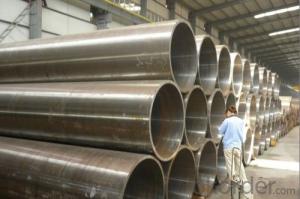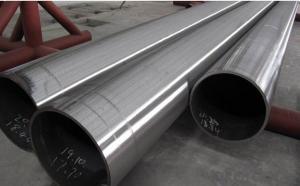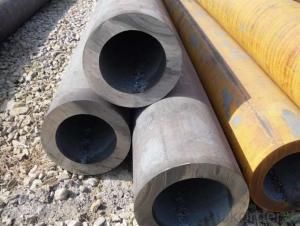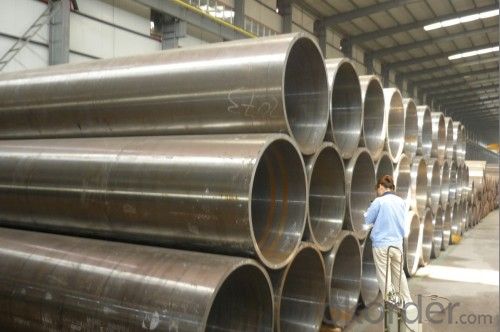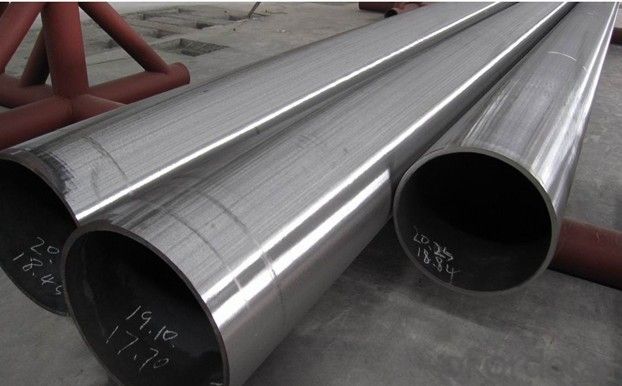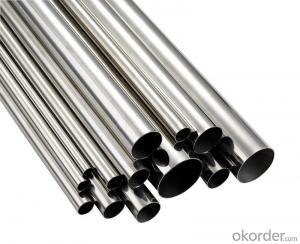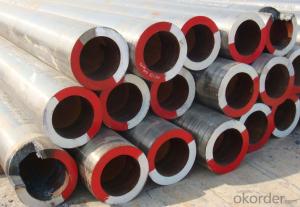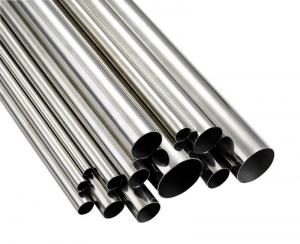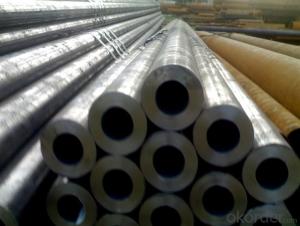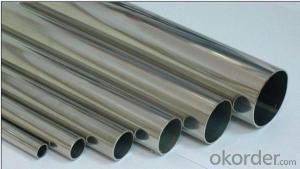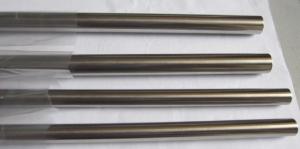Seamless Ferritic Alloy-Steel Pipe for High-Temperature Service in China
- Loading Port:
- Shanghai
- Payment Terms:
- TT OR LC
- Min Order Qty:
- 1000 kg
- Supply Capability:
- 10000 kg/month
OKorder Service Pledge
OKorder Financial Service
You Might Also Like
Product name
ASTM A335 alloy steel pipe
2/ Standard
ASTM SA213, SA335, A369, A209, A250, G3462, G3467, DIN17175, BS3059-2
3/ Material
A213: T2, T5, T9, T11, T12, T22, T91, T92
A335: P1, P2, P5, P9, P11, P12, P21, P22, P91, P92
DIN17175: 15Mo3, 13CrMo44, 10CrMo910, 12CrMo195
BS3059: 360, 440, 460, 620
JIS G3458: STPA12, STPA20, STPA22, STPA23, STPA24, STPA25, STPA26
JIS G3462: STPA12, STBA13, STBA20, STBA22, STBA23, STBA24, STBA25, STBA26
4/ Outside diameter: 141.3mm~720mm
5/ Wall Thickness: 25mm~100mm
6/ Length: 6m-12m, also can be manufactured by customers' requirements
7/ Type: Seamless
8/ Type of ends: Plain ends or bevel ends
9/ Coating for protection: Can be required according to customers' requirement
10/ Application: Widely used in oil, chemical industry, electricity, boiler industry of high-temperature resistance, low temperature resistance, corrosion resistance in pilie lines, etc.
ASTM A335 Seamless Alloy-Steel Pipe
Standard: BS 1139, BS 3059-2, JIS G3454-2007
Grade: 10#-45#, 15NiCuMoNb5, 10Cr9Mo1VNb
Detailed introduction to ASTM A335 seamless alloy steel pipe:
ASTM A335 seamless alloy steel pipe
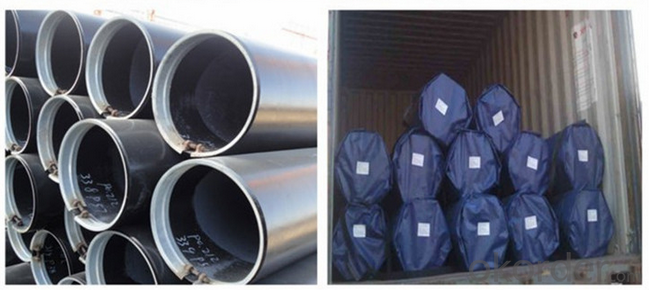
Packaging Detail: | Bundle or Container or as per customers requirement. |
Delivery Detail: | within 25 days after we receive an irrevocable L/Cor 30% deposit |
ASTM A335 Seamless Alloy-Steel Pipe
Standard: BS 1139, BS 3059-2, JIS G3454-2007
Grade: 10#-45#, 15NiCuMoNb5, 10Cr9Mo1VNb
Detailed introduction to ASTM A335 seamless alloy steel pipe:
ASTM A335 seamless alloy steel pipe

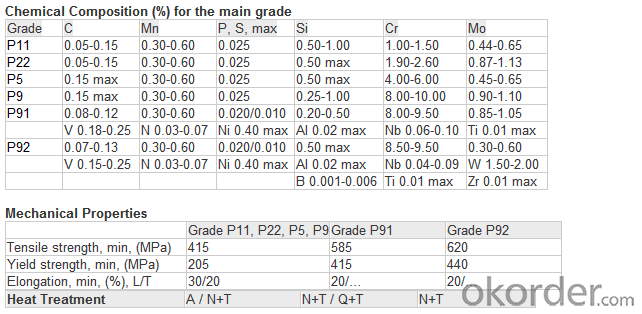
FAQ:
1) why you chose us ?
Professional Manufacturer and supplier of Steel pipe
More than 14 years’ professional producing experience
We can get the lowest ex-factory prices. The price are quite reasonable and it is lower than our commercial peers. also, we can guarantee the qualities of our products.
BV, ISO certificates and SGS test can be provided to assure the quality of our products.
2) Our minimum order quantity:
10 Metric Tons or one 20ft or 40ft Container.
3) How about the Delivery Time?
The steel pipe will be produced since we getting your deposit by T/T or Your original L/C. For normal size, some stocks in our factory now, we can supply once you need.
4)What kind of payment does your company support?
T/T, 100% L/C at sight, Cash, Western Union are all accepted.
5) Do you charge for the samples?
According to our company principle, we just charge for samples, you pay for the freight /courier charge.
6) Main market:
Mid East, South America, Africa, Southeast Asia, India etc
FAQ:
1) why you chose us ?
Professional Manufacturer and supplier of Steel pipe
More than 14 years’ professional producing experience
We can get the lowest ex-factory prices. The price are quite reasonable and it is lower than our commercial peers. also, we can guarantee the qualities of our products.
BV, ISO certificates and SGS test can be provided to assure the quality of our products.
2) Our minimum order quantity:
10 Metric Tons or one 20ft or 40ft Container.
3) How about the Delivery Time?
The steel pipe will be produced since we getting your deposit by T/T or Your original L/C. For normal size, some stocks in our factory now, we can supply once you need.
4)What kind of payment does your company support?
T/T, 100% L/C at sight, Cash, Western Union are all accepted.
5) Do you charge for the samples?
According to our company principle, we just charge for samples, you pay for the freight /courier charge.
6) Main market:
Mid East, South America, Africa, Southeast Asia, India etc
- Q: How are steel pipes used in the automotive manufacturing industry?
- Steel pipes are commonly used in the automotive manufacturing industry for various purposes such as exhaust systems, chassis frames, and structural components. These pipes provide durability, strength, and resistance to corrosion, making them ideal for applications that require high performance and reliability.
- Q: Can steel pipes be used for underground cooling systems?
- Indeed, underground cooling systems can make use of steel pipes. Thanks to their durability, strength, and resistance to corrosion, steel pipes are widely employed in numerous applications, including underground cooling systems. They are adept at handling the rigorous demands of cooling systems, such as high pressure and temperature requirements. Moreover, steel pipes can be conveniently installed and maintained by means of welding or threading them together. Nonetheless, it is crucial to ensure that the steel pipes are adequately coated or insulated in order to avert corrosion and uphold heat transfer efficiency.
- Q: How do steel pipes perform in high-altitude applications?
- Steel pipes perform well in high-altitude applications due to their strength, durability, and resistance to extreme weather conditions. They can withstand the low temperatures and high winds typically found at high altitudes, making them a reliable choice for various industries such as oil and gas, construction, and infrastructure development. Additionally, steel pipes have the ability to maintain their structural integrity under high pressure, making them suitable for transporting fluids and gases at high altitudes.
- Q: What are the different types of joints used with steel pipes?
- There are several types of joints used with steel pipes, including threaded joints, welded joints, flanged joints, and grooved joints.
- Q: What is the minimum wall thickness for steel pipes?
- The minimum wall thickness for steel pipes depends on various factors such as the pipe size, pressure rating, and intended use. However, as a general guideline, the minimum wall thickness for steel pipes is typically determined by industry standards and regulations, and it can range from a few millimeters to several inches. It is important to consult specific codes and standards relevant to the application to accurately determine the required minimum wall thickness for steel pipes.
- Q: How do steel pipes handle thermal expansion and contraction?
- Steel pipes are able to handle thermal expansion and contraction due to their unique properties and design. When exposed to high temperatures, steel pipes expand as the molecules within the material gain energy and move more vigorously. Conversely, when exposed to low temperatures, steel pipes contract as the molecules lose energy and move less vigorously. To accommodate these changes, steel pipes are manufactured with certain features. One such feature is the allowance of clearance between pipe joints. This clearance allows for expansion and contraction without causing stress or deformation in the pipe. Additionally, the use of expansion joints or flexible connectors within the piping system helps to absorb the thermal movements and prevent damage. Furthermore, steel pipes are often installed with proper anchoring and support systems. These systems are designed to allow the pipes to freely expand and contract within a certain range without causing excessive stress or strain on the structure or surrounding components. Anchoring and support systems also help to maintain the overall stability and integrity of the piping system. In some cases, thermal insulation materials are applied to steel pipes to minimize temperature changes and reduce the effects of expansion and contraction. These insulating materials help to maintain a more consistent temperature within the pipe, reducing the magnitude of thermal movements. Overall, steel pipes are well-suited to handle thermal expansion and contraction due to their inherent strength and flexibility. With proper design, installation, and maintenance, steel pipes can effectively accommodate temperature changes without compromising their structural integrity or functionality.
- Q: How to distinguish between steel pipe and spiral pipe material?
- The alloy tube can be divided into: low alloy pipe, alloy pipe structure, high alloy tube, high strength tube. Bearing tube, heat resistant acid resistant stainless pipe, precision alloy (such as cutting alloy) pipe, high temperature alloy tube, etc..
- Q: What are the different types of joints used to connect steel pipes?
- There are several types of joints commonly used to connect steel pipes, including threaded joints, welded joints, flanged joints, and grooved joints.
- Q: What are the different coating options available for steel pipes?
- There are several different coating options available for steel pipes, including epoxy coatings, polyethylene coatings, zinc coatings, and asphalt coatings. These coatings are applied to the exterior of the pipes to provide protection against corrosion, abrasion, and other environmental factors. Each coating option offers different benefits and is chosen based on the specific requirements of the project or application.
- Q: Are steel pipes suitable for desalination plants?
- Yes, steel pipes are suitable for desalination plants. Steel pipes offer several advantages that make them a suitable choice for desalination plants. Firstly, steel pipes are highly resistant to corrosion, which is crucial in desalination plants where the presence of saltwater can be highly corrosive. The corrosion resistance of steel pipes ensures the longevity and durability of the infrastructure, reducing maintenance and replacement costs. Secondly, steel pipes have high strength and can withstand high-pressure conditions, which are often required in desalination plants. The ability of steel pipes to handle high-pressure water flow without any deformations or leaks ensures the efficient and reliable operation of the desalination process. Furthermore, steel pipes have excellent heat resistance properties, making them suitable for desalination plants that often involve heat-intensive processes such as distillation or reverse osmosis. Steel pipes can withstand high temperatures without any structural damage, ensuring the safe and efficient transfer of heated water or steam. In addition, steel pipes are readily available and have a wide range of sizes and specifications, allowing for flexibility in design and construction of desalination plants. This availability and versatility make steel pipes a cost-effective choice for desalination projects. Overall, due to their corrosion resistance, high strength, heat resistance, availability, and cost-effectiveness, steel pipes are highly suitable for desalination plants and are widely used in the industry.
Send your message to us
Seamless Ferritic Alloy-Steel Pipe for High-Temperature Service in China
- Loading Port:
- Shanghai
- Payment Terms:
- TT OR LC
- Min Order Qty:
- 1000 kg
- Supply Capability:
- 10000 kg/month
OKorder Service Pledge
OKorder Financial Service
Similar products
Hot products
Hot Searches
Related keywords
